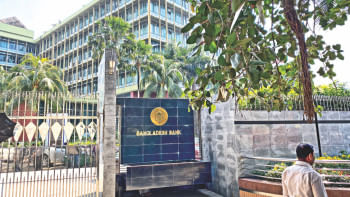Remittance hits 8-month high

March's receipts were nearly 25 per cent higher than February's $1.49 billion but down 2.67 per cent from $1.91 billion recorded in the same month last year
Remittance to Bangladesh rose to an eight-month high in March as migrant workers sent home a higher amount to help their families meet an increased expenditure during Ramadan, official data showed yesterday.
Expatriates transferred $1.86 billion last month, the highest since July when $1.87 billion flew into the country, according to the Bangladesh Bank.
March's receipts were nearly 25 per cent higher than February's $1.49 billion but down 2.67 per cent from $1.91 billion recorded in the same month last year.
Families of migrant workers usually receive a higher amount of remittance ahead and during Ramadan and ahead of Eid, said Arfan Ali, managing director of Bank Asia. The fasting month began yesterday.
"The exchange rate has also been adjusted upwards amid higher demand for US dollars," he said.
Because of the escalated commodity prices, the US dollar supply in Bangladesh has come under strain as import payments have outstripped export receipts. Exports and remittances are two major sources of American dollars for the country.
Syed Mahbubur Rahman, managing director of Mutual Trust Bank, also credited Ramadan, banks' efforts to attract more American dollars, and the government's incentive for the increased flow of remittance.
"Banks are offering higher rates for incoming US dollars in order to facilitate imports," he said.
The government also provides a 2.5 per cent cash subsidy on remittance to prop up the flow of foreign currencies with a view to tackling the foreign exchange crisis.
Bangladesh received $15.30 billion in remittances in the first nine months of the current fiscal year, a decrease of 21.56 per cent compared to the same period a year ago.
Last fiscal year, migrant workers sent home a record $24.77 billion.
Remittance flow had rocketed to an "abnormal level" during the pandemic-induced two years for "abnormal factors" compared to the pre-crisis levels, said Zahid Hussain, a former lead economist of the World Bank's Dhaka office.
The abnormal factors include the disruption faced by the unofficial money transfer channel as international travels came to a halt due to Covid-19, fuelling the use of banks and other official channels to transfer funds.
Since the global economies are returning to normalcy thanks to improved coronavirus situations, the global hundi cartel, which operates an illegal cross-boundary financial system, has become active again, evidenced by a lower flow of remittance to Bangladesh so far in the current fiscal year.
Hussain is, however, upbeat that remittance would increase in the second half of 2022 if there is stability globally since an increasing number of workers are going abroad in search of jobs.
Alone in 2021, about six lakh workers, which also include the labourers who had to return home after losing jobs after the virus outbreak, went back. The manpower export has kept the upward trend since the demand for low-skilled workers internationally has spiked.
According to Hussain, the fundamental determinant of remittance is how many workers of a country work abroad.
"If the number of workers goes up, remittance will climb. We are seeing an improvement in that fundamental."
The economist thinks the elevated level of oil price, caused by the Russia-Ukraine war, would give a boost to the oil-producing Middle Eastern economies and this will have an impact on the labour market in the countries, in terms of wages or demand.
The Middle-Eastern countries are home to 75 per cent of Bangladesh's about one crore citizens working abroad, said Shariful Hasan, head of migration of Brac, citing data from the Bureau of Manpower, Employment and Training and other sources.
Because of the pandemic-induced disruptions, only about 2.17 lakh people went abroad in 2020. But nearly 3 lakh workers have already left the country in the first three months of 2022, he said.


 For all latest news, follow The Daily Star's Google News channel.
For all latest news, follow The Daily Star's Google News channel. 



Comments